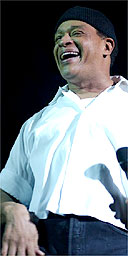
Al Jarreau is not releasing his new album, All I Got, until September. This gig in the North Sea jazz festival's cut-down transfer to London seemed to be a taster for it, but only attracted a half-full house. That was a pity, because although the singer initially sounded tentative and steamrollered by his band, the show turned out to be a warmer and more spontaneous affair than his gig here two years ago.
Much of the performance dealt with familiar Jarreau materials: ecstatically building Latin shuffles, thundering funk, quirky soul songs with jazzy tone-bendings that often echoed the singer's first hero, Jon Hendricks. But a lot of the new material was written by Jarreau in collaboration with his band-members, and the strong bond between them - even though the group sounded pretty routine in the percussion section - was increasingly evident as the show warmed up.
Jarreau spent a good deal of time talking to the audience about the inequities of life, particularly in South Africa and eastern Europe. He also put in a plea for active resistance to the lowest common denominators of the corporate musical industry: "Nothing sampled or pre-recorded here," he declared. He is capable of generating the sounds of so many instruments himself that electronics are superfluous.
Jarreau began with a tidal wave of a funk overture that mingled several songs, his light and cutting upper register and occasional hair-raising falsetto soaring over the general thrash. The South African-dedicated Jacaranda Bougainvillea introduced lyricism and space to the show. And Jarreau's roaring mid-range, ascending to airy whispers, was at its most eloquent on a simple duet with pianist Freddie Ravel.
The smoochy soul-jazz dialogue that Jarreau delivers so tellingly with his powerful backing singer, Debbie Davis, this time involved a surprise element that made you jump in your seat, with the sudden Stevie Wonder-ish arrival of bassist Chris Walker in its finale. Life Is, meanwhile, became a gripping fusion of deep rumbling sounds, mouth-organ jangles and percussive syllables. It is stadium jazz, of course, full of overkill and muddy sound mixes, but Jarreau still gives it an intermittent edge.

